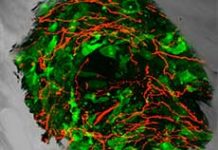In a research work that aimed to evaluate whether plasmatic BRAF allele fraction determined by droplet digital polymerase chain reaction (ddPCR) can be used to improve understanding of the prognosis in patients with BRAF V600E-mutated metastatic colorectal cancer (mCRC) treated with BRAF inhibitor-based combination therapy, Spanish and Italian investigators showed that plasmatic BRAF allele fraction determined by ddPCR is a reliable surrogate of tumour burden and aggressiveness of disease and identifies patients who may benefit from treatment intensification. The results highlight the utility of plasmatic BRAF allele fraction using ddPCR, particularly considering the difficulties of obtaining tissue samples in this specific population. Furthermore, the incorporation of plasmatic BRAF allele fraction data could support better patient stratification in prospective clinical studies. Findings are published by Dr. Elena Elez of the Medical Oncology Department, Vall d’Hebron Hospital Campus, Vall d’Hebron Institute of Oncology (VHIO) in Barcelona, Spain and colleagues on 13 March 2023 in the Annals of Oncology. Prospective validation in a large cohort is needed.
The authors wrote that the BRAF V600E mutation occurs in up to 10% of patients with CRC. It is associated with poor prognosis, with median overall survival (OS) of only 11 months, and poor response to standard chemotherapy. Unlike in BRAF V600E-mutated melanoma, use of targeted agents in BRAF–mutated mCRC did not achieve clinical benefit, due to signalling upregulation via the EGFR receptor with BRAF blockade monotherapy. This was addressed in subsequent studies by combining an anti-EGFR with the BRAF inhibitor. Some studies incorporated also a third drug to enhance clinical activity, including MEK or PI3CA inhibitors.
Development of targeted treatment for BRAF V600E-mutated mCRC culminated with the BEACON phase III study that evaluated encorafenib-cetuximab with or without binimetinib versus irinotecan plus cetuximab-based chemotherapy. Confirmed overall response rates were 26.8% for the triplet and 19.5% for the doublet, versus 1.8% for the control arm, and median OS was 9.3 months for both the triplet and the doublet, versus 5.9 months for the control arm.
Despite the overall poor prognosis associated with BRAF mutations, there is a high level of clinical heterogeneity in outcomes, with 10-20% of patients surviving more than 2 years whereas 10% of patients survive for less than 5 months. Various prognostic scores have been developed, based on clinical and pathological data, identifying specific subgroups with relevant differences in life expectancy. This clinical heterogeneity has been confirmed in two transcriptomic signatures. However, transcriptomic signatures cannot be performed easily in routine clinical practice as they require large amount of tumour tissue, are expensive, and have high turnaround times-turnover requirements.
In several tumour types, the allele fraction of specific mutations such as BRAF or KRAS have been associated with clinical outcomes with higher allele fraction indicating the worse prognosis. The prognostic and predictive value of BRAF mutant allele fraction has been evaluated in previous studies in patients with CRC, but these cohorts included a small number of patients who were heterogeneously treated.
This research was conducted in a prospective discovery cohort that included 47 patients with BRAF V600E-mutated mCRC treated with a combination of BRAF inhibitor, anti-EGFR with or without MEK inhibitor in clinical studies and real-world practice. Results were validated in an independent multicentre cohort of 29 patients. Plasmatic BRAF V600E allele fraction cut-off at baseline was defined in the discovery cohort with ddPCR. All patients had tissue-confirmed BRAF V600E mutations.
Patients with high allele fraction had major frequency of liver metastases and more metastatic sites. In the discovery cohort, median progression-free survival (PFS) and OS were 5.2 and 11.5 months, respectively. Patients with tumours with high BRAF allele fraction (≥2%) showed worse PFS (hazard ratio [HR] 2.97, 95% confidence interval [CI] 1.55-5.69; p = 0.001) and worse OS (HR 3.28, 95% CI 1.58-6.81; p = 0.001) than patients with tumours with low BRAF allele fraction (<2%).
In the multivariable analysis, BRAF allele fraction levels maintained independent significance. In the validation cohort, high BRAF allele fraction status was associated with worse PFS (HR 3.83, 95% CI 1.60-9.17; p = 0.002) and a trend toward worse OS was observed (HR 1.86, 95% CI 0.80-4.34; p = 0.15). An exploratory analysis of predictive value showed that patients with high BRAF allele fraction expressed more benefit from triplet therapy than patients with low BRAF allele fraction (PFS and OS interaction tests, p < 0.01).
The authors commented that although NGS offers many advantages and will likely be widely adopted in the mid to long-term, they considered importance to validate a technique that could easily fill in the gap during the coming years and in settings where NGS will be difficult to implement. They concluded that plasmatic BRAF allele fraction determined by ddPCR is a reliable surrogate of tumour burden and aggressiveness in patients with BRAF V600E-mutated mCRC treated with a BRAF inhibitor plus an anti-EGFR with or without a MEK inhibitor and may identify patients who could benefit from treatment intensification. The results warrant further validation of plasmatic BRAF allele fraction to refine clinical stratification and guide treatment strategies.
VHIO acknowledged the Cellex Foundation for providing research facilities and equipment, the FERO Foundation for funding support, the Centro de Investigación Biomédica en Red de Cáncer (CIBERONC) from the the Institute of Health Carlos III (ISCIII), and the Department of Health (Generalitat de Catalunya), and the State Agency for Research (Agencia Estatal de Investigación), Luigi Vanvitelli University in Naples, Italy, Mutual Médica and Ministerio de Ciencia e Inovación for their support in this research. This work was supported by the Accelerator Award from Fundacion Científica – Asociacion Espanola Contra el Cancer (FC -AECC)/ Associazione Italiana per la Ricerca sul Cancro (AIRC) /Cancer Research United Kingdom (CRUK). This work was supported by the Fundación FERO; the Fondo Europeo de Desarrollo Regional (FEDER), Fundación AECC, CRIS contra el Cancer and Mutual Medica Fellowship.
Reference
Ros J, Mattio J, Villacampa G, et al. Plasmatic BRAF-V600E allele fraction as a prognostic factor in metastatic colorectal cancer treated with BRAF combinatorial treatments. Annals of Oncology; Published online 13 March 2023. doi: https://doi.org/10.1016/j.annonc.2023.02.016








